Sai Praneeth Karimireddy
Evaluating and Incentivizing Diverse Data Contributions in Collaborative Learning
Jun 08, 2023Abstract:For a federated learning model to perform well, it is crucial to have a diverse and representative dataset. However, the data contributors may only be concerned with the performance on a specific subset of the population, which may not reflect the diversity of the wider population. This creates a tension between the principal (the FL platform designer) who cares about global performance and the agents (the data collectors) who care about local performance. In this work, we formulate this tension as a game between the principal and multiple agents, and focus on the linear experiment design problem to formally study their interaction. We show that the statistical criterion used to quantify the diversity of the data, as well as the choice of the federated learning algorithm used, has a significant effect on the resulting equilibrium. We leverage this to design simple optimal federated learning mechanisms that encourage data collectors to contribute data representative of the global population, thereby maximizing global performance.
Federated Conformal Predictors for Distributed Uncertainty Quantification
Jun 01, 2023



Abstract:Conformal prediction is emerging as a popular paradigm for providing rigorous uncertainty quantification in machine learning since it can be easily applied as a post-processing step to already trained models. In this paper, we extend conformal prediction to the federated learning setting. The main challenge we face is data heterogeneity across the clients - this violates the fundamental tenet of exchangeability required for conformal prediction. We propose a weaker notion of partial exchangeability, better suited to the FL setting, and use it to develop the Federated Conformal Prediction (FCP) framework. We show FCP enjoys rigorous theoretical guarantees and excellent empirical performance on several computer vision and medical imaging datasets. Our results demonstrate a practical approach to incorporating meaningful uncertainty quantification in distributed and heterogeneous environments. We provide code used in our experiments https://github.com/clu5/federated-conformal.
Online Learning in a Creator Economy
May 19, 2023Abstract:The creator economy has revolutionized the way individuals can profit through online platforms. In this paper, we initiate the study of online learning in the creator economy by modeling the creator economy as a three-party game between the users, platform, and content creators, with the platform interacting with the content creator under a principal-agent model through contracts to encourage better content. Additionally, the platform interacts with the users to recommend new content, receive an evaluation, and ultimately profit from the content, which can be modeled as a recommender system. Our study aims to explore how the platform can jointly optimize the contract and recommender system to maximize the utility in an online learning fashion. We primarily analyze and compare two families of contracts: return-based contracts and feature-based contracts. Return-based contracts pay the content creator a fraction of the reward the platform gains. In contrast, feature-based contracts pay the content creator based on the quality or features of the content, regardless of the reward the platform receives. We show that under smoothness assumptions, the joint optimization of return-based contracts and recommendation policy provides a regret $\Theta(T^{2/3})$. For the feature-based contract, we introduce a definition of intrinsic dimension $d$ to characterize the hardness of learning the contract and provide an upper bound on the regret $\mathcal{O}(T^{(d+1)/(d+2)})$. The upper bound is tight for the linear family.
FLamby: Datasets and Benchmarks for Cross-Silo Federated Learning in Realistic Healthcare Settings
Oct 10, 2022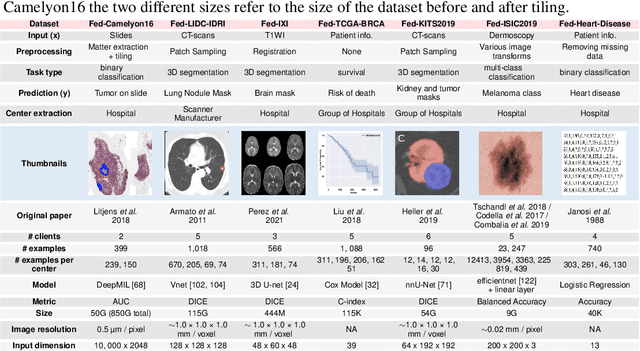
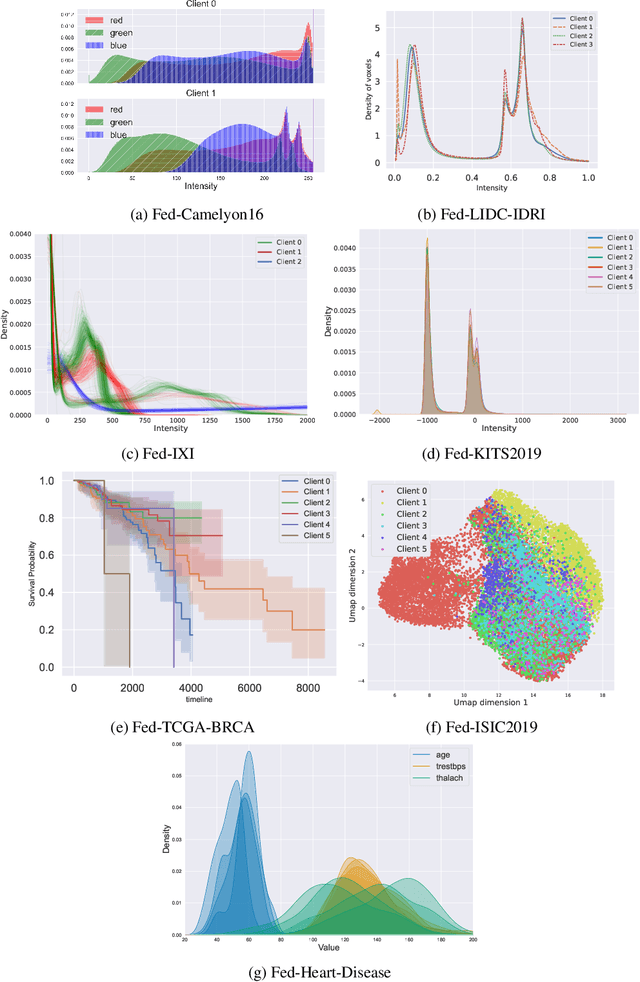
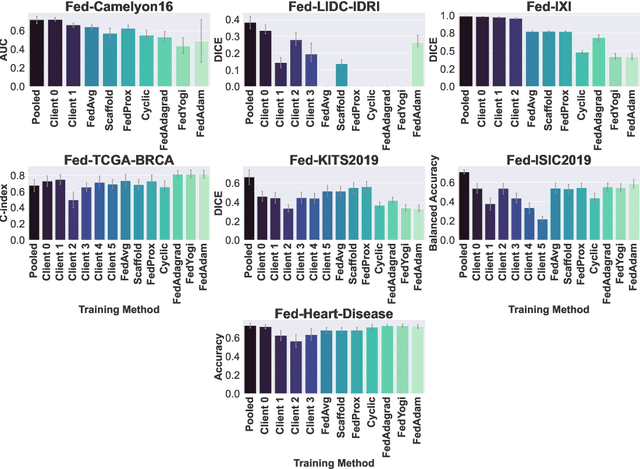

Abstract:Federated Learning (FL) is a novel approach enabling several clients holding sensitive data to collaboratively train machine learning models, without centralizing data. The cross-silo FL setting corresponds to the case of few ($2$--$50$) reliable clients, each holding medium to large datasets, and is typically found in applications such as healthcare, finance, or industry. While previous works have proposed representative datasets for cross-device FL, few realistic healthcare cross-silo FL datasets exist, thereby slowing algorithmic research in this critical application. In this work, we propose a novel cross-silo dataset suite focused on healthcare, FLamby (Federated Learning AMple Benchmark of Your cross-silo strategies), to bridge the gap between theory and practice of cross-silo FL. FLamby encompasses 7 healthcare datasets with natural splits, covering multiple tasks, modalities, and data volumes, each accompanied with baseline training code. As an illustration, we additionally benchmark standard FL algorithms on all datasets. Our flexible and modular suite allows researchers to easily download datasets, reproduce results and re-use the different components for their research. FLamby is available at~\url{www.github.com/owkin/flamby}.
TCT: Convexifying Federated Learning using Bootstrapped Neural Tangent Kernels
Jul 13, 2022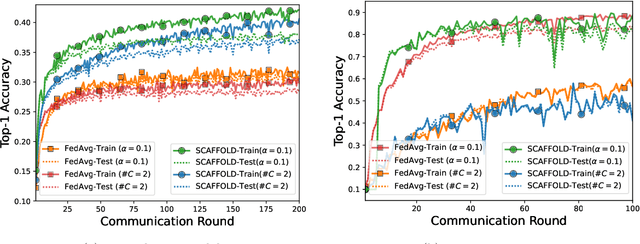
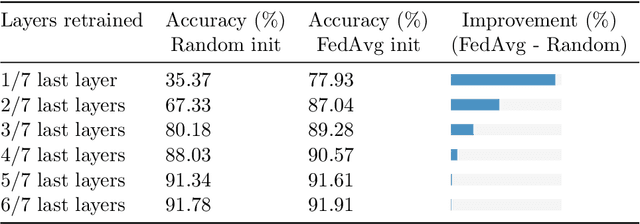
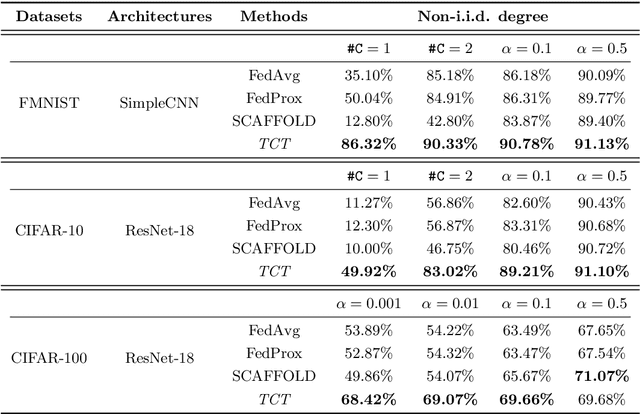

Abstract:State-of-the-art federated learning methods can perform far worse than their centralized counterparts when clients have dissimilar data distributions. For neural networks, even when centralized SGD easily finds a solution that is simultaneously performant for all clients, current federated optimization methods fail to converge to a comparable solution. We show that this performance disparity can largely be attributed to optimization challenges presented by nonconvexity. Specifically, we find that the early layers of the network do learn useful features, but the final layers fail to make use of them. That is, federated optimization applied to this non-convex problem distorts the learning of the final layers. Leveraging this observation, we propose a Train-Convexify-Train (TCT) procedure to sidestep this issue: first, learn features using off-the-shelf methods (e.g., FedAvg); then, optimize a convexified problem obtained from the network's empirical neural tangent kernel approximation. Our technique yields accuracy improvements of up to +36% on FMNIST and +37% on CIFAR10 when clients have dissimilar data.
Mechanisms that Incentivize Data Sharing in Federated Learning
Jul 10, 2022
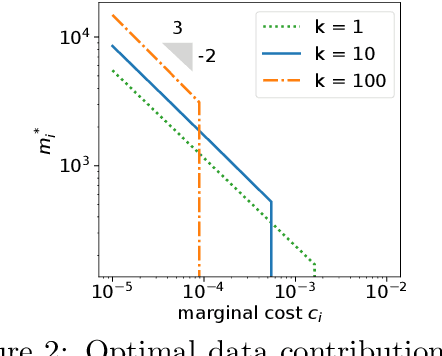
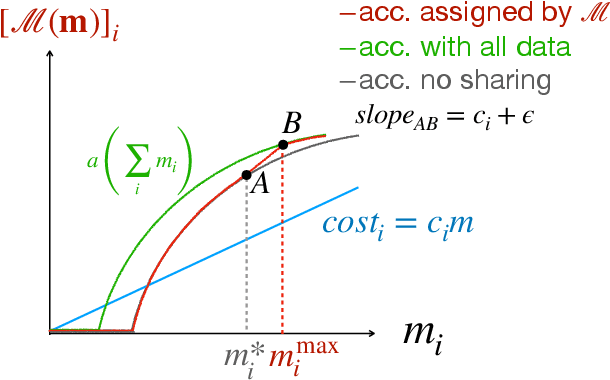
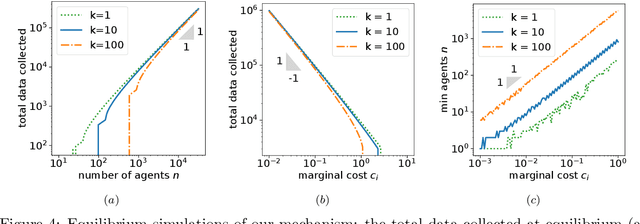
Abstract:Federated learning is typically considered a beneficial technology which allows multiple agents to collaborate with each other, improve the accuracy of their models, and solve problems which are otherwise too data-intensive / expensive to be solved individually. However, under the expectation that other agents will share their data, rational agents may be tempted to engage in detrimental behavior such as free-riding where they contribute no data but still enjoy an improved model. In this work, we propose a framework to analyze the behavior of such rational data generators. We first show how a naive scheme leads to catastrophic levels of free-riding where the benefits of data sharing are completely eroded. Then, using ideas from contract theory, we introduce accuracy shaping based mechanisms to maximize the amount of data generated by each agent. These provably prevent free-riding without needing any payment mechanism.
Optimization with access to auxiliary information
Jun 01, 2022


Abstract:We investigate the fundamental optimization question of minimizing a target function $f(x)$ whose gradients are expensive to compute or have limited availability, given access to some auxiliary side function $h(x)$ whose gradients are cheap or more available. This formulation captures many settings of practical relevance such as i) re-using batches in SGD, ii) transfer learning, iii) federated learning, iv) training with compressed models/dropout, etc. We propose two generic new algorithms which are applicable in all these settings and prove using only an assumption on the Hessian similarity between the target and side information that we can benefit from this framework.
Agree to Disagree: Diversity through Disagreement for Better Transferability
Feb 09, 2022

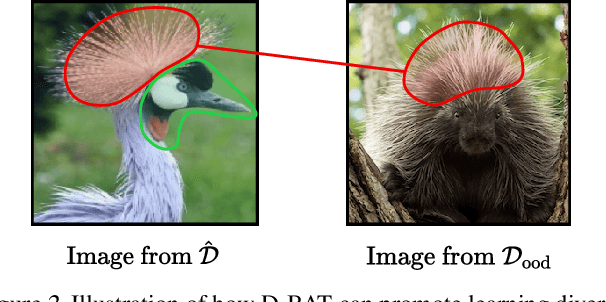

Abstract:Gradient-based learning algorithms have an implicit simplicity bias which in effect can limit the diversity of predictors being sampled by the learning procedure. This behavior can hinder the transferability of trained models by (i) favoring the learning of simpler but spurious features -- present in the training data but absent from the test data -- and (ii) by only leveraging a small subset of predictive features. Such an effect is especially magnified when the test distribution does not exactly match the train distribution -- referred to as the Out of Distribution (OOD) generalization problem. However, given only the training data, it is not always possible to apriori assess if a given feature is spurious or transferable. Instead, we advocate for learning an ensemble of models which capture a diverse set of predictive features. Towards this, we propose a new algorithm D-BAT (Diversity-By-disAgreement Training), which enforces agreement among the models on the training data, but disagreement on the OOD data. We show how D-BAT naturally emerges from the notion of generalized discrepancy, as well as demonstrate in multiple experiments how the proposed method can mitigate shortcut-learning, enhance uncertainty and OOD detection, as well as improve transferability.
Byzantine-Robust Decentralized Learning via Self-Centered Clipping
Feb 03, 2022



Abstract:In this paper, we study the challenging task of Byzantine-robust decentralized training on arbitrary communication graphs. Unlike federated learning where workers communicate through a server, workers in the decentralized environment can only talk to their neighbors, making it harder to reach consensus. We identify a novel dissensus attack in which few malicious nodes can take advantage of information bottlenecks in the topology to poison the collaboration. To address these issues, we propose a Self-Centered Clipping (SCClip) algorithm for Byzantine-robust consensus and optimization, which is the first to provably converge to a $O(\delta_{\max}\zeta^2/\gamma^2)$ neighborhood of the stationary point for non-convex objectives under standard assumptions. Finally, we demonstrate the encouraging empirical performance of SCClip under a large number of attacks.
Linear Speedup in Personalized Collaborative Learning
Nov 10, 2021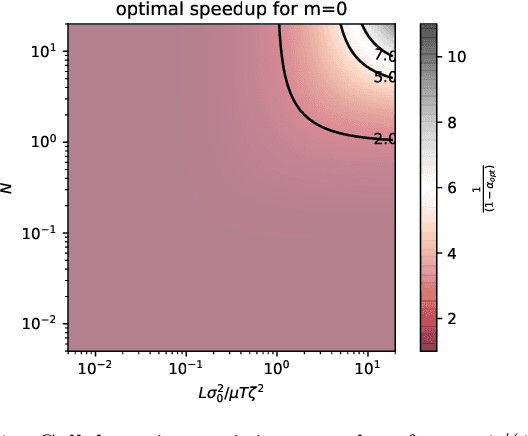
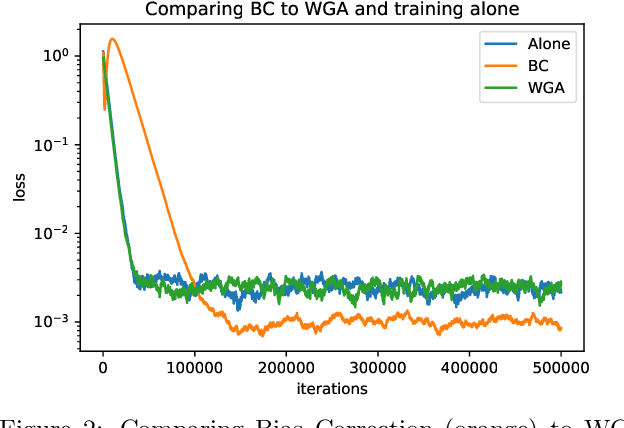
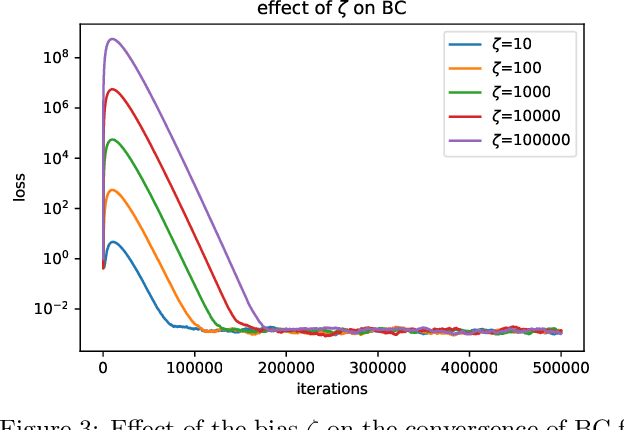
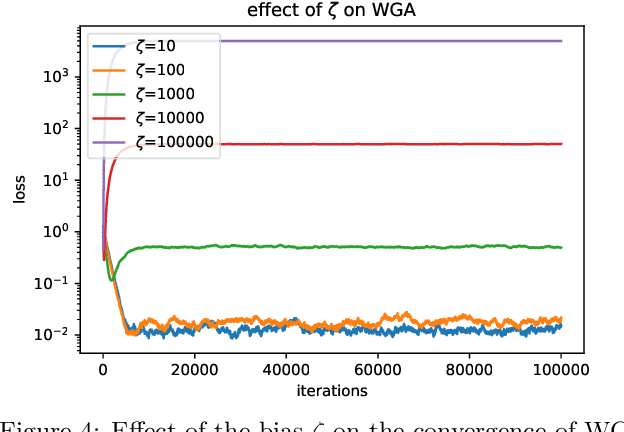
Abstract:Personalization in federated learning can improve the accuracy of a model for a user by trading off the model's bias (introduced by using data from other users who are potentially different) against its variance (due to the limited amount of data on any single user). In order to develop training algorithms that optimally balance this trade-off, it is necessary to extend our theoretical foundations. In this work, we formalize the personalized collaborative learning problem as stochastic optimization of a user's objective $f_0(x)$ while given access to $N$ related but different objectives of other users $\{f_1(x), \dots, f_N(x)\}$. We give convergence guarantees for two algorithms in this setting -- a popular personalization method known as \emph{weighted gradient averaging}, and a novel \emph{bias correction} method -- and explore conditions under which we can optimally trade-off their bias for a reduction in variance and achieve linear speedup w.r.t.\ the number of users $N$. Further, we also empirically study their performance confirming our theoretical insights.
 Add to Chrome
Add to Chrome Add to Firefox
Add to Firefox Add to Edge
Add to Edge